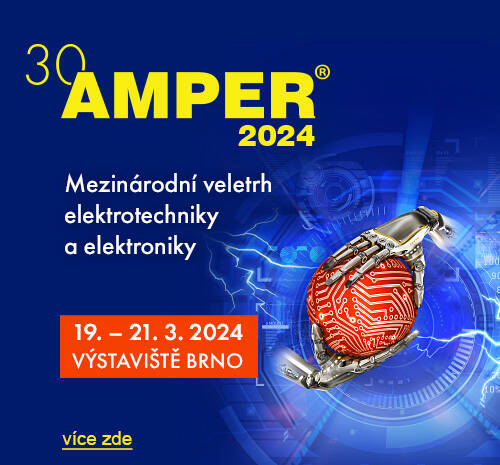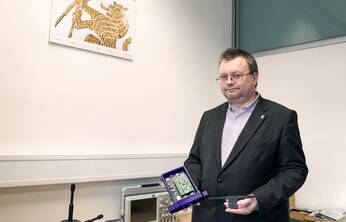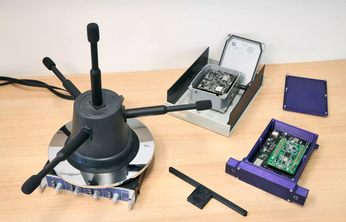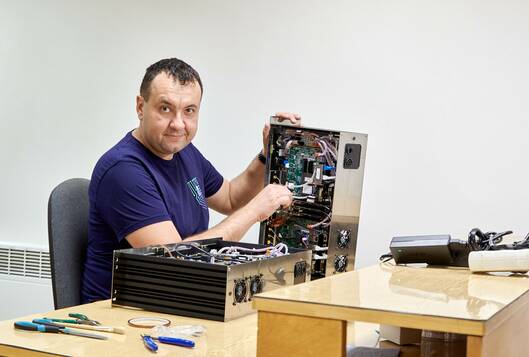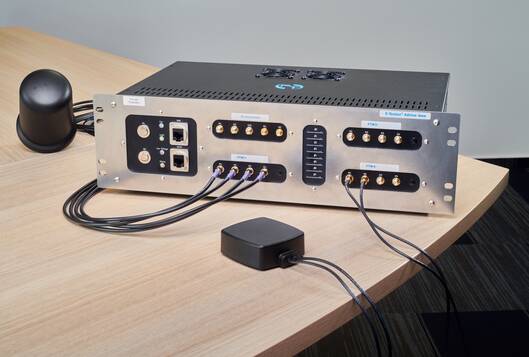Amper as a leading B2B trade fair, which maps out technological news and innovations and points the way to future trends in the electrical industry, regularly attracts around 25,000 professionals, executives, and private and corporate investors. Each year, exhibitors include Czech and world leaders in their fields and new companies entering the market.
FEE CTU will be represented at the fair by researchers from the Department of Measurement and the Department of Telecommunication Engineering.
Acoustic detector
One of the presented technologies will be a demonstrator of an indoor acoustic sensor for security applications. The unit uses two MEMS microphones and a signal processor, which can distinguish e.g. gunshot noise from other background sounds with high reliability and determine the direction of arrival of the acoustic pulse with an uncertainty of better than 3° (horizontally).
The improvement of the acoustic detector was introduced by representatives of the Department of Measurement of the CTU FEL in January this year. The system uses artificial intelligence to determine the type and calibre of the weapon, which works with an extensive database of shooting records of various kinds of guns and ammunition.
"We collected shot samples during seven years of work on the project, both at shooting ranges and in urban areas or other environments. This database of acoustic signals has become the basis for advanced methods of classification of gunshots using neural networks and other machine learning tools," explained Prof. Jan Holub, head of the Department of Measurement at the CTU FEE.
F-Tester
Researchers from the Department of Telecommunication Engineering will present an upgraded version of the F-Tester, which they delivered to the Czech Telecommunications Office last autumn. Thanks to the measurement system, the controller can carry out long-term, uninterrupted testing of 4G/5G signal coverage quality from test cars while moving and transfer the results to map documents immediately after the measurement.
"The 4G/5G data service quality control technology we have developed in our department will not only contribute to the gradual improvement of Internet access but will also lead to better public awareness, including consumer protection," presented the most significant benefits of the new solution Associate Professor Jiří Vodrážka, Head of the Department of Telecommunication Technology at FEE CTU.
"We decided to implement everything in our laboratories, so we have guaranteed quality and know what we send our customers. We had to design, manufacture, and assemble several components instead of buying them, such as special electronic components and interconnecting cables. We couldn't find any on the market that met the specified parameters," says Dr. Zbyněk Kocur, lead developer of the F-Tester® measuring system.
Magnetic field display
Next, visitors will see the bachelor's project of Václav Zelený, who designed and produced a magnetic field display under the supervision of David Novotný. This technology can be used to learn about magnetism and serious applications (e.g., easy work with permanent magnets).
The device uses programmable three-color LEDs and Hall sensors. Device is based on the STM32 microcontroller, where individual printed circuit boards communicate with each other using the UART bus.
Software Defined Instruments
The Software Defined Instruments (SDI) solution has been used by the Department of Measurement at the CTU FEE to support practical teaching in physics and electronics for more than five years. It is a solution for laboratory instruments using available microcomputer modules (Raspberry PI PICO, Nucleo STM32) or a microcontroller connected to an adapter.
A typical SDI solution can be an inexpensive alternative to standard instruments such as a pulse generator, oscilloscope, generator, voltmeter, counter, and logic analyzer. Although a very simplistic solution, these SDIs can be used to demonstrate basic electronics and measurement principles and relatively complex issues in signal theory (sampling theorem and its violation effects, signal mirroring, aliasing, stroboscopic sampling).
FEE CAMP
Representatives of the Department of Telecommunication Engineering will reveal the theme of the FEE CAMP 2024. This technology-oriented camp is designed for high school students and is held regularly during the summer holidays.
Last year, the task was to build an apparatus to receive satellite imagery to determine the location of the missing dean.
400 exhibitors from 19 countries
At the Amper fair, there will be a total of 400 exhibitors, of which 130 will be from abroad (Slovakia, Germany, Austria, Poland, Switzerland, Belgium, France, Great Britain, Turkey, Croatia, Hungary, Ireland, Italy, Taiwan, China, India, and others).
New this year is the Amper Innovatorium - a broader presentation of technical universities, research centers, and startups. Seven universities with an electrical engineering focus from the Czech Republic and Slovakia are registered.

